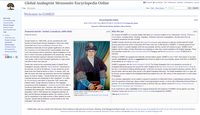Anabaptism is a Christian movement which traces its origins to the Radical Reformation in the 16th century. Anabaptists believe that baptism is valid only when candidates freely confess their faith in Christ and request to be baptized. Commonly referred to as believer's baptism, it is opposed to baptism of infants, who are not able to make a conscious decision to be baptized.

Mennonites are a group of Anabaptist Christian communities tracing their roots to the epoch of the Radical Reformation. The name Mennonites is derived from the cleric Menno Simons (1496–1561) of Friesland, part of the Holy Roman Empire, present day Netherlands. Menno Simons became a prominent leader within the wider Anabaptist movement and was a contemporary of Martin Luther (1483–1546) and Philip Melanchthon (1497-1560). Through his writings about the Reformation Simons articulated and formalized the teachings of earlier Swiss Anabaptist founders as well as early teachings of the Mennonites founded on the belief in both the mission and ministry of Jesus. Formal Mennonite beliefs were codified in the Dordrecht Confession of Faith (1632), which affirmed "the baptism of believers only, the washing of the feet as a symbol of servanthood, church discipline, the shunning of the excommunicated, the non-swearing of oaths, marriage within the same church", nonresistance, and in general, more emphasis on "true Christianity" involving "being Christian and obeying Christ" as they interpret it from the Holy Bible.

Jakob Ammann was a Swiss Anabaptist leader and the namesake of the Amish religious movement.

The Brethren in Christ Church (BIC) is a Christian denomination. Falling within the Anabaptist tradition of Christianity, the Brethren in Christ Church has roots in the Mennonite church, with influences from the revivals of Radical Pietism and the holiness movement. They have also been known as River Brethren and River Mennonites. The Canadian denomination is called Be In Christ.

The Mennonite World Conference (MWC) is an international Mennonite Anabaptist Christian denomination. Its headquarters are in Kitchener, Ontario, Canada.
The Fellowship of Evangelical Bible Churches (FEBC) is a small evangelical Christian denomination with an Anabaptist Mennonite heritage. Most of the denomination's approximately 5000 members are in congregations located in the U.S. and Canada.

The Canadian Conference of Mennonite Brethren Churches (CCMBC) is a Mennonite Brethren denomination in Canada. It is a member of the Mennonite World Conference and the Evangelical Fellowship of Canada.

The Mennonite Central Committee (MCC) is a relief service, and peace agency representing fifteen Mennonite, Brethren in Christ and Amish bodies in North America. The U.S. headquarters are located in Akron, Pennsylvania; the Canadian headquarters is located in Winnipeg, Manitoba.
Old Order Mennonites form a branch of the Mennonite tradition. Old Order are those Mennonite groups of Swiss German and south German heritage who practice a lifestyle without some elements of modern technology, still drive a horse and buggy rather than cars, wear very conservative and modest dress, and have retained the old forms of worship, baptism and communion.
The Radical Reformation represented a response to perceived corruption both in the Catholic Church and in the expanding Magisterial Protestant movement led by Martin Luther and many others. Beginning in Germany and Switzerland in the 16th century, the Radical Reformation gave birth to many radical Protestant groups throughout Europe. The term covers Radical Reformers like Thomas Müntzer and Andreas Karlstadt, the Zwickau prophets, and Anabaptist groups like the Hutterites and the Mennonites.
The Mennonite Historical Library (MHL) is considered the world's most prominent and complete collection of resources and artifacts pertaining to Mennonites and related Anabaptist groups. It is housed in the Harold and Wilma Good Library on the campus of Goshen College in Goshen, Indiana. The specialty library was founded in 1906 under the guidance of Harold S. Bender and Ernst Correll. Elizabeth Miller is the current director.
Donald B. Kraybill is an American author, lecturer, and educator on Anabaptist faiths and culture. Kraybill is widely recognized for his studies on Anabaptist groups and in particular the Amish. He has researched and written extensively on Anabaptist culture. He is Distinguished Professor Emeritus at Elizabethtown College and Senior Fellow Emeritus at Elizabethtown's Young Center for Anabaptist and Pietist Studies.
The Swiss Brethren are a branch of Anabaptism that started in Zürich, spread to nearby cities and towns, and then was exported to neighboring countries. Today's Swiss Mennonite Conference can be traced to the Swiss Brethren.

The Chortitz Heritage Church is a former Mennonite church building located in the Canadian postal district of Randolph, Manitoba. The building was home to the Randolph Chortitzer Mennonite Church, one of the first Mennonite congregations in western Canada. Established in 1876 by Mennonite immigrants arriving from the Bergthal Colony in Russia, the original building was destroyed by fire and replaced by a new building in 1897, which still stands today.

Columbia Bible College (CBC) is an evangelical Mennonite Bible College in Abbotsford, British Columbia, Canada. It is affiliated with two regional Mennonite conferences, British Columbia Mennonite Brethren and Mennonite Church British Columbia. Columbia is accredited by the international Association for Biblical Higher Education (ABHE), and is registered with the British Columbia Private Career Training Institution Association (PCTIA).
John D. Roth was a professor of history at Goshen College (1985-2022), the editor of The Mennonite Quarterly Review (1995-2022), and director of the Institute for the Study of Global Anabaptism (2011-2022) at Goshen College. He received his PhD from the University of Chicago. Roth has published widely on topics related to the Radical Reformation, ecumenism, global Anabaptism, and contemporary Anabaptist-Mennonite life and thought. His books include Choosing Against War: A Christian View, Beliefs: Mennonite Faith and Practice, Stories: How Mennonites Came to Be, and Practices: Mennonite Worship and Witness. He discussed his book on war in several places including the Netherlands. He has also written for Christianity Today concerning the Anabaptists and Amish.
The Mennonite Church USA Archives was founded in 2001 under the denominational merger of the (old) Mennonite Church and the General Conference Mennonite Church. Prior to 2001, the two largest Mennonite denominations maintained separate archives: the Archives of the Mennonite Church, located on the Goshen College campus, housed materials pertaining to the (old) Mennonite Church, while the Mennonite Library and Archives on the Bethel College campus held the records of the General Conference Mennonite Church.
C. Henry Smith was a Mennonite historian born in Metamora, Illinois. Smith was the first (known) American Mennonite to earn a Ph.D., doing so at the University of Chicago in 1907. C. Henry Smith taught two stints at Goshen College and became the first dean of the college, before going on to teach at Bluffton University for the rest of his life. Smith's doctoral dissertation was published as The Mennonites of America in 1909 and remained the only comprehensive Mennonite history of American Mennonites into the 1950s.
Mennonite Brethren Centenary Bible College (MBCBC), founded in 1920, is a Mennonite Bible College in Shamshabad and is affiliated with the Conference of the Mennonite Brethren Churches in India and the nation's first University, the Senate of Serampore College (University)with degree-granting authority validated by a Danish charter and ratified by the Government of West Bengal.
Anabaptist/Mennonite Church sexual misconduct cases are cases of acts by theologians, educators, pastors, chaplains, and staff or people in positions of power in Anabaptist/Mennonite churches, institutions, or affiliated organizations deemed as sexual misconduct by church organizations. Some of these cases may also be deemed as sexual abuse by law. There have been a number of cases of sexual misconduct involving notable and influential Anabaptist Christian theologians of the late 20th and early 21st century in North America, and scholarship, media reports, and church magazines have revealed that there have been numerous cases of sexual abuse throughout the history of the Anabaptist/Mennonite Church.






